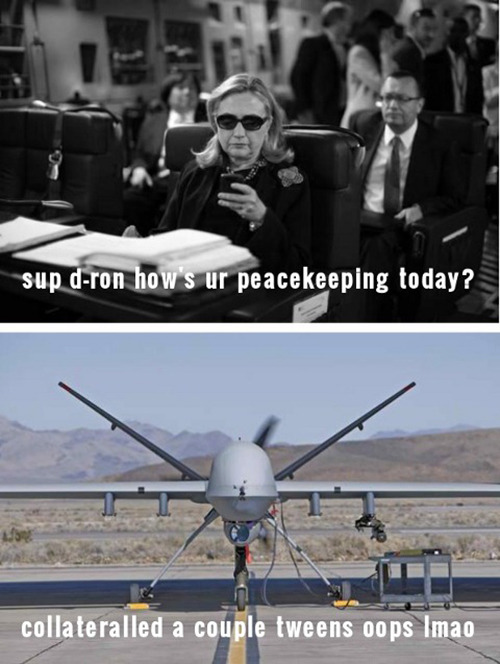
The Pentagon is considering awarding Distinguished Warfare Medals to drone pilots and Glen Greenwald is furious. He sees it as an attempt “to depict drone warfare as some sort of courageous and noble act.” Greenwald and I are in accord in condemning the use of drones for assassination, but I don’t know that I agree with his critique here. Greenwald says flying a drone cannot meet any of our traditional criteria for valor because:
Whatever one thinks of the justifiability of drone attacks, it’s one of the least “brave” or courageous modes of warfare ever invented. It’s one thing to call it just, but to pretend it’s “brave” is Orwellian in the extreme. Indeed, the whole point of it is to allow large numbers of human beings to be killed without the slightest physical risk to those doing the killing. Killing while sheltering yourself from all risk is the definitional opposite of bravery.
I just don’t think he’s right that the pilots are really ‘safe.’ Wired and NPR both report that drone pilots are experiencing high levels of stress and PTSD that takes a toll on their families. The soldiers are safe from physical damage and death, but psychological wounds can’t be written off; they’re harder to diagnose and treat and more difficult for a family to compensate for. This kind of danger seems to be what one of the pilots quoted in Greenwald’s piece is referring to when he says:
Luther (Trey) Turner III, a retired colonel who flew combat missions during the gulf war before he switched to flying Predators in 2003, said that he doesn’t view his combat experience flying drones as “valorous.” “My understanding of the term is that you are faced with danger. And, when I am sitting in a ground-control station thousands of miles away from the battlefield, that’s just not the case.” But, he said, “I firmly believe it takes bravery to fly a U.A.V.” — unmanned aerial vehicle — “particularly when you’re called upon to take someone’s life. In some cases, you are watching it play out live and in color.” As more than one pilot at Holloman told me, a bit defensively, “We’re not just playing video games here.”
Which seems like an echo of one of the themes in Drew Gilpin Faust’s This Republic of Suffering. She introduces the second chapter with:
And in the Civil War, it was killing, not dying, as Orestes Brownson observed in 1862, that demanded “the harder courage,” for it required the more significant departure from soldiers’ understanding of themselves as human beings, and, in mid-nineteenth century America, as Christians.
And that leads me to ask what, exactly, the military is trying to valorize when it awards medals. If they are singling out soldiers as role models, then perhaps drone pilots should be excluded. But, a lot of the time, these decorations are framed in terms of recognition of sacrifice. You can end up in sin-eater territory pretty fast once you start admitting that the sacrifice you’re commemorating is the sacrifice of peace and innocence. What are you supposed to say at the speech, “Thank you for putting aside your natural revulsion to killing, even at the cost of your own stability!”
So what’s the appropriate way to handle this? For starters, we should probably think long and hard about what’s worth a war, if we know it requires the kind of sacrifice that we feel ashamed of asking for. If we don’t think these sacrifices are something noble to aspire to, if we think that they diminish or wound something good in humans, then maybe the appropriate tone is more mournful, more like the way we would behave at the funeral for a person who stepped into the path of a bullet to save someone else. We can commend their desire to protect others but it would be bizarre to say there was anything particularly good about sustaining a gunshot wound. We need to praise the why but not the what and think seriously about whether this is a particularly desirable way to express love of countrymen.











